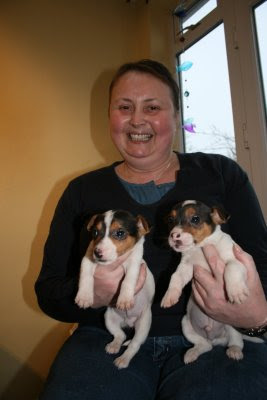As some of you know Deb has suffered from palpitations for many years. Usually she has one or two episodes a year which last about one to two hours. While having a palpitation Deb's pulse goes up to 190 beats per minute and her blood pressure drops. Around Christmas Deb had 3 episodes in quick succession and we mentioned this to the oncologist in case it was related to the tumour treatment. He said not but that the condition should be treated. Our GP referred Deb to a cardiologist who we saw on 6 February at our local hospital (Good Hope). He said he could not do much until we had identified what type of arrhythmia it was. However we discussed various options including taking pills to stop it happening (Deb was not keen on more pills) or having a recoding device implanted under the skin that could be activated when an attack occurred. In the end we settled on getting to our GP/hospital as soon as a palpitation started and putting Deb onto an ECG.
At about 04:30 pm on Friday 13th ( Liz was visiting us) Deb had a palpitation. We went to our GP's surgery and the nurse put Deb directly onto an ECG. This confirmed that Deb was suffering from a type of arrhythmia called supraventricular tachycardia (SVT). The rapid beating of the heart during SVT can make the heart a less effective pump so that the cardiac output is decreased and the blood pressure drops. The following symptoms are typical with a rapid pulse of 150-250 beats per minute: pounding chest, shortness of breath, rapid breathing and dizziness.
The GP referred us to Good Hope with a letter so they would see Deb straight away. This worked. They put Deb in an intensive care cubicle and hooked her up to various monitors. They all started bleeping and flashing alarms. Her pulse rate was about 200 beats per min and was 'extremely tachy'. The doctor tried to stop the attack by getting Deb to blow into a syringe and by manipulating her vagus nerve in her neck Neither of these procedures worked. She was then given an intravenous injection of adenosine. This drug causes transient heart block. Before putting it in the doctor warned Deb she would have a feeling of 'impending doom' while the drug worked. This proved successful and her pulse rate returned to normal.
However they did insist on keeping Deb in overnight for observation. She was eventually discharged about midday on the Saturday. They have prescribed beta blockers which she takes daily and which will hopefully prevent a further attack.
Tuesday, 17 February 2009
I need to lose weight - update
START WEIGHT (05/01/09) = 13 st 4 lbs
TARGET WEIGHT = 12 st 4 lbs
CURRENT WEIGHT(16/02/09) = 12 st 9 lbs
I have lost 9 lbs in 6 weeks. This is remarkable given my recent lapses with roast dinners and Indian takeaways. These are the foods which I must stop eating if I am to achieve my target weight: peanuts, wine gums, roast potatoes and poppadoms.
TARGET WEIGHT = 12 st 4 lbs
CURRENT WEIGHT(16/02/09) = 12 st 9 lbs
I have lost 9 lbs in 6 weeks. This is remarkable given my recent lapses with roast dinners and Indian takeaways. These are the foods which I must stop eating if I am to achieve my target weight: peanuts, wine gums, roast potatoes and poppadoms.
16 February - Retirement from HSE
Today I submitted my formal notice of retirement. I am supposed to give 3 months notice but we have agreed a shorter time and my provisional retirement date is 31 March 2009.
I have been with HSE for 36 years and I have really enjoyed the variety of my work. I have been on the top of Humber Bridge and into the sewers of Birmingham. I have been in operating theatres and TV studios. I have been inside the double-skinned bottom of a ship under construction and the torpedo tubes of a submarine in dry dock. I have seen a rainbow inside a power station cooling tower and thrown up with the odour of rotting flesh in a fish meal factory. I have been on a helicopter to an oil rig 50 miles north of the Shetland Isles. And next month it all ends.
I have a list of things I can do in retirement. But I welcome any suggestions.
I have been with HSE for 36 years and I have really enjoyed the variety of my work. I have been on the top of Humber Bridge and into the sewers of Birmingham. I have been in operating theatres and TV studios. I have been inside the double-skinned bottom of a ship under construction and the torpedo tubes of a submarine in dry dock. I have seen a rainbow inside a power station cooling tower and thrown up with the odour of rotting flesh in a fish meal factory. I have been on a helicopter to an oil rig 50 miles north of the Shetland Isles. And next month it all ends.
I have a list of things I can do in retirement. But I welcome any suggestions.
Monday, 9 February 2009
9 February 2009 - Results of 2nd MRI scan

Deb holding the new additions to our family - Flynn is on the left and Bertie on the right.
Today we went to the QE hospital and saw Dr Sanghera to discuss the results of Deb's second MRI scan since she had radiotherapy treatment. This second scan, taken on the 29 January, was compared to the baseline scan taken in November.
The results were not good. The latest scan showed that the active parts of the tumour had not responded to treatment and had significantly increased in size. This is real tumour growth and not pseudo-progression due to radiation effects.
We discussed various issues with Dr Sanghera:
1 Chemotherapy Deb's chemotherapy regime will change. Instead of a monthly cycle of 5 days chemo followed by 23 days off, she will now be given a lower dose of the chemotherapy drug (temozolomide) on a continuous basis. The new dose will be 100 mg per day (previous dose 380 mg per day during treatment).
2 Steroids As discussed in the blogpost on 12 January, following the last visit to the hospital Deb reduced her steroid dose to 1.0 mg per day. After a few days she found she started to have persistent headaches. After consulting the Macmillan nurse (Fred) it was agreed she should increase her dose to 3 mg per day. This increase did cure the headaches. Dr Sanghera thought the headaches may have been due to tumour growth and suggested Deb remain at a dose of 3 mg per day.
3 Blood tests Deb's blood test results today were good (WBC 12.5, RBC 4.2, Platelets 227). It was agreed that continuous chemotherapy would start today.
4 MRI Scan The next MRI scan is scheduled for 2 months time when the effect of the change in the chemotherapy regime will be assessed.
5 Surgery I asked again if surgery could be considered. Dr Sangera did not think that surgery would be a viable option but it would be discussed at the case conference meeting which will take place tomorrow.
6 Appointments Deb's next appointment at the hospital will be in 2 weeks time to have further tests to review the effect of the continuous chemotherapy on the blood.
I asked about Deb's prognosis given the scan results. Dr Sanghera did not know. He said we should concentrate on the positives ( doctors must be taught this phrase at med school. It was what the doctor said to me when I first went to the QE to talk about Deb's diagnosis and subsequently at every meeting when they have had to communicate bad news ). The positives are: 1) By scanning the change in the tumour has been caught early and the treatment can be adjusted 2) Some people have responded well to the continuous chemotherapy treatment and it may bring the tumour under control 3) If the continuous temozolomide treatment does not work there are other drugs that can be tried (this is most likely to be a combination of 3 drugs called PCV).
Can I ask family and friends not to call. Deb and I do not feel like talking about this right now. Deb will call you at some time over the next few days. Thanks.
Sunday, 8 February 2009
Fund raising in Wales

Darren, Deb and Karen with signed football shirts
On Saturday 31 January, Deb and I travelled to Llantwit Major in South Wales. Darren (who is the son of Julie - Deb's niece) had organised a fund raising event in his local rugby club. It was a great night. The place was packed (Darren had sold 160 tickets). I made a short speech saying why we were there. The highlight of the evening was an auction of signed football and rugby shirts. The shirts, including those signed by the first team squads at Chelsea, Arsenal and other major premiership clubs (and Nottingham Forest and the Wales Grand Slam winning team of 2008) went for enormous amounts of money - between £200 and £300 each. There were also other prizes auctioned (including a sailing holiday on the Isle of Wight, a signed book by David Campese) and a raffle. In total over £4000 was raised. The money will be split between Brain Tumour UK (a charity which gives support to brain tumour sufferers their family and friends) and our local brain tumour support group. After the auction a local band played - who were really good - they started with a cover of the Kinks 'You Really Got Me': excellent). All the Tattersall clan were there and Deb had a great night out. Thanks to Darren who made all this happen.
Subscribe to:
Comments (Atom)




